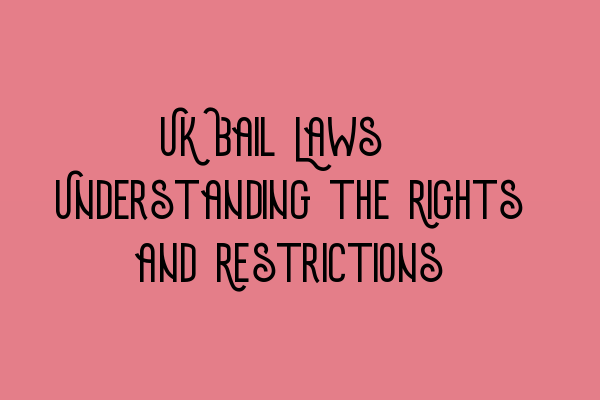UK Bail Laws: Understanding the Rights and Restrictions
Welcome to the SQE Criminal Law & Practice Law UK blog! In this post, we will delve into the intricate world of UK bail laws. Bail is a fundamental aspect of the criminal justice system that plays a crucial role in ensuring fair and just proceedings for individuals who have been accused or charged with a crime. It provides them with the opportunity to be released from custody while awaiting trial, subject to certain conditions. Understanding the rights and restrictions associated with bail is essential for both legal professionals and individuals involved in criminal cases.
What is Bail?
Bail is the temporary release of an individual who is awaiting trial or other legal proceedings. It serves as a guarantee that the accused person will return to court when required and allows them to be free from custody during the pre-trial period. Bail is typically granted upon the provision of a financial or non-financial surety, which ensures that the accused does not flee or pose a threat to public safety.
The Purpose of Bail
The primary purpose of bail is to strike a balance between the presumption of innocence and the protection of the public. It acknowledges that individuals should not be held in custody without compelling reasons and provides them with an opportunity to prepare their defense and engage with legal professionals effectively. However, bail also takes into account the potential risks associated with releasing an accused person, especially in cases where there is a flight risk or a threat to public safety.
Rights and Restrictions
1. Presumption of Innocence: One of the most important rights associated with bail is the presumption of innocence. Every accused person has the right to be considered innocent until proven guilty, and bail helps maintain this presumption by allowing them to remain free until their trial.
2. Conditions of Bail: When granting bail, the court may impose certain conditions to ensure that the accused complies with the terms of their release. These conditions can range from attending court hearings regularly to surrendering travel documents or reporting to a designated police station.
3. Bail Variation: In some cases, the conditions of bail can be varied or amended based on changing circumstances. For example, if the accused needs to travel for medical reasons, they may apply to the court for a variation in their bail conditions.
4. Bail Revocation: Bail can be revoked if the accused fails to comply with the conditions set by the court or if new information arises that warrants their detention. This ensures that individuals who pose a threat to public safety or are likely to abscond are not allowed to remain free.
It is important to note that the specific rights and restrictions associated with bail may vary based on the jurisdiction and the nature of the offense. Therefore, seeking legal advice from a qualified professional is highly recommended to understand the intricacies of bail laws in a particular case.
Conclusion
Bail is an essential component of the criminal justice system that balances the rights of the accused with the need for public safety. Understanding the rights and restrictions associated with bail is crucial for legal professionals, individuals involved in criminal cases, and anyone with an interest in criminal law. If you have any further questions or need guidance regarding bail laws, our team at SQE Criminal Law & Practice Law UK is here to assist you.
For additional resources on SQE exam preparation, please check out our related articles:
